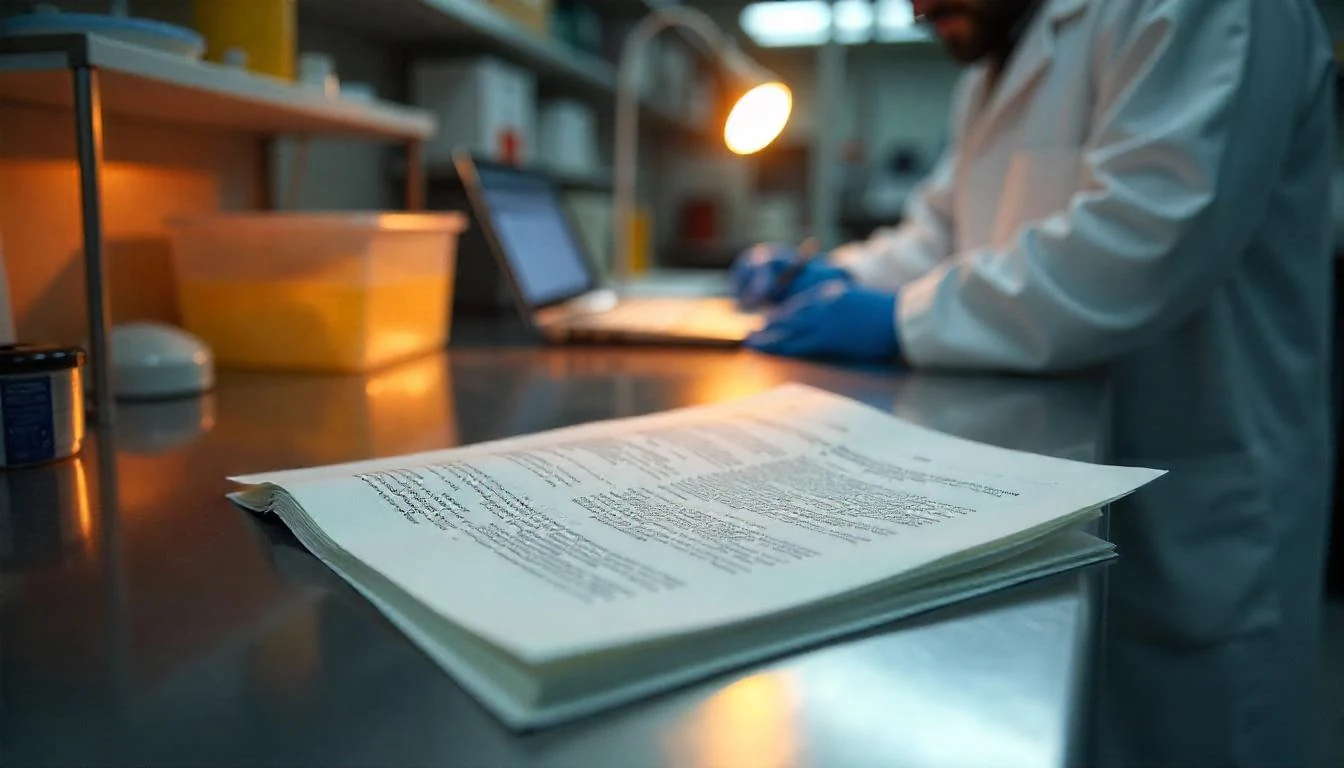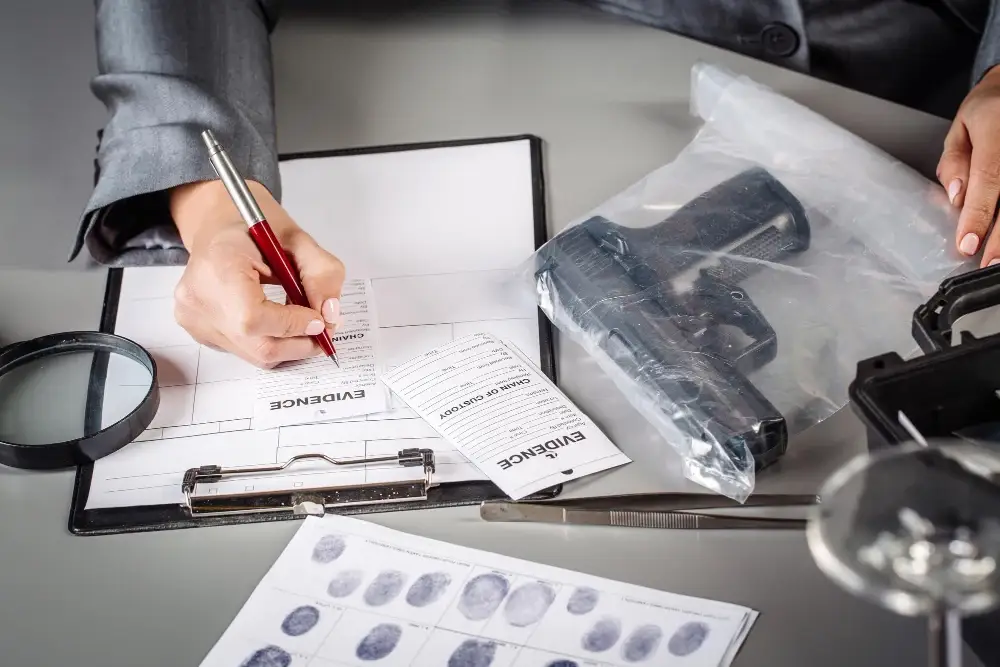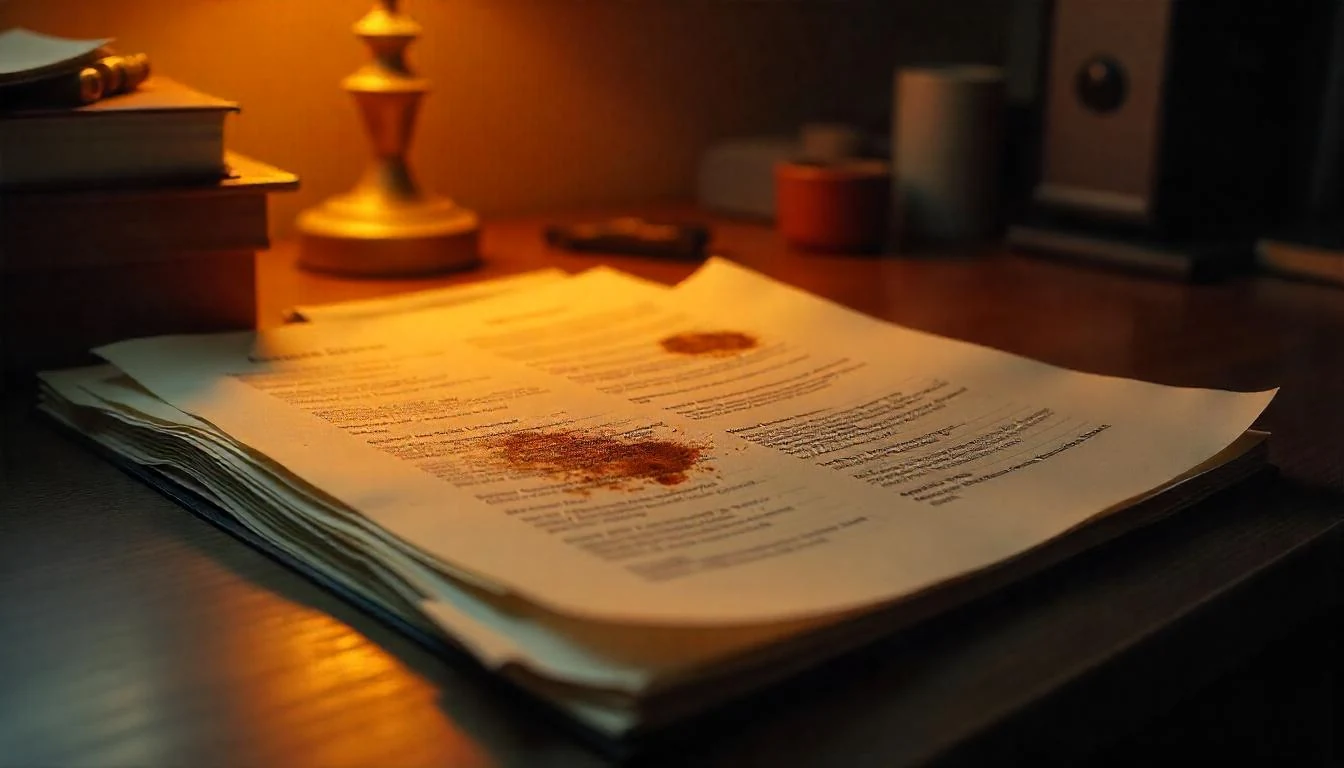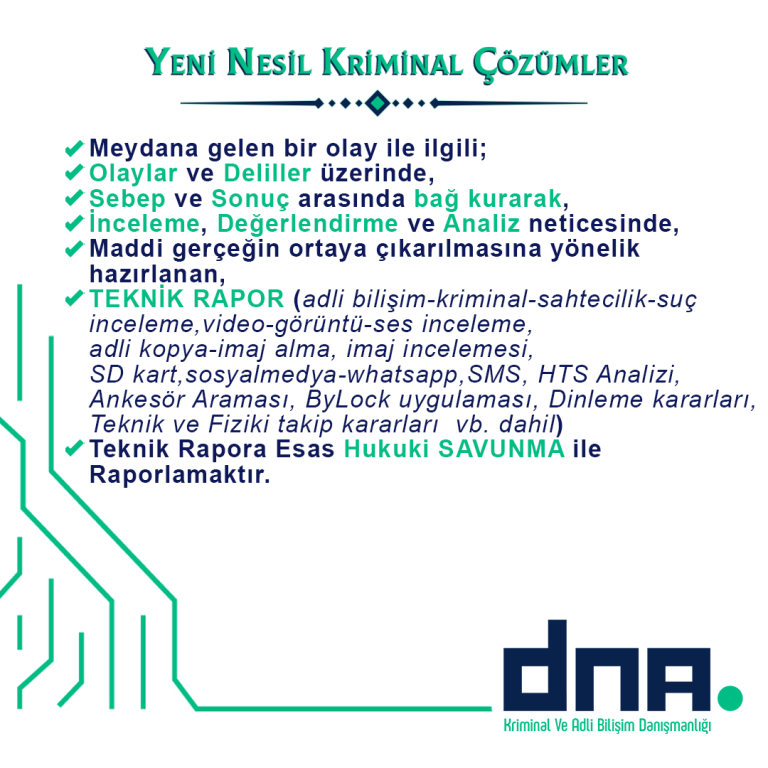An expert report plays a critical role in illuminating technical and specialized matters during criminal proceedings. These reports, which courts rely on when making decisions, serve as important evidence in reaching material truth. Especially in complex situations requiring technical knowledge, the court strengthens its decision by consulting expert opinion on matters outside its area of expertise. In this process, both the preparation of the report and the parties’ right to object ensure fair and balanced criminal proceedings.
For Your Expert Report Needs
Fast, Reliable, and Scientific Solutions
An accurate and complete expert report is your greatest advantage in legal proceedings. As DNA Criminal and Digital Forensics, we provide technically accurate, legally compliant, and rapid solutions with our expert team.

Who is an Expert Witness?
In the Turkish legal system, an expert witness is a specialist appointed at the request of courts or parties to provide opinions on technical, scientific, medical, or professional matters related to a case or dispute. They contribute to the judicial process by providing information, analysis, and assessments to the court.
Expert witness duty is undertaken by individuals with expertise and experience in specific fields. They are appointed by the court and submit their findings in a written report after examining the requested subject. The expert report can be influential evidence in the judge’s decision-making process; the court may base its ruling on this report.
However, the most fundamental obligation of an expert witness is to maintain independence and impartiality. They must provide opinions based on their expertise with an objective approach, reporting only technical data-based assessments without direct communication with any party.
In practice, it’s impossible for judges and prosecutors to have technical knowledge in every field. Expert consultation may be necessary, especially in areas such as complex calculations, incident analysis, or digital trace evaluation. At this point, the expert witness institution steps in and contributes to fair trial through expert opinion.
Article 63 of the Criminal Procedure Code and Article 266 of the Civil Procedure Code , specify when expert witnesses can be consulted. Both regulations commonly state that expert opinion can only be sought in cases requiring special technical expertise where legal knowledge alone is insufficient.
However, an important point to note is this: The law clearly states that judges cannot consult experts on matters they can resolve with their general legal knowledge. Although there is a common tendency in practice to send every file to an expert, these articles aim to limit such situations.
Role and Importance of Expert Witnesses
Expert witnesses are specialists consulted by courts on matters requiring technical knowledge. They are appointed at the request of judges or parties in cases requiring scientific, professional, medical, or special expertise, and provide opinions by evaluating the disputed matter.
The appointed expert must have sufficient knowledge and practical experience in the relevant field. The expert objectively examines the assigned subject and presents their findings in a detailed and comprehensible report. This report serves as an important reference for the court’s decision-making.
Impartiality is the fundamental principle of expert witnessing. The expert must avoid personal views or interests, making only objective assessments based on technical data and expertise. They do not communicate directly with parties and prepare a report solely for the court.
In conclusion, expert witnessing plays a critical role in ensuring a fair trial process. Accurate and complete expert reports significantly contribute to court decisions being made more soundly, impartially, and accurately.
What is an Expert Report?
An expert report is an official document submitted to the court following the examination of technical, scientific, or professional matters requiring expertise within a case or legal dispute. This report is prepared by one or more expert witnesses appointed by the court.
The report contains findings, assessments, and opinions obtained through the expert’s examinations. The court may accept this report as evidence and consider it in the decision-making process. However, the expert report is not binding on the court; the judge may accept the report or reach a different conclusion with justification.
While expert reports are mostly used in private law disputes, they also play an important role in public cases. For example, expert opinions may be sought in cases involving structural defects in construction, medical malpractice damages, or financial document irregularities. Similarly, reports can be guiding in workplace accidents, insurance claims, and professional liability cases.
The validity and effectiveness of the report depend on both the expert’s competence and the preparation of the report in a correct, complete, clear, and impartial manner. During the examination process, various methods such as document analysis, site inspection, technical measurements, or witness statements may be used. The prepared report should be written in clarity understandable to everyone while maintaining technical language, and the terminology used should be simple and meaningful.
In conclusion, an expert report serves as a reliable assessment tool for both the judicial process and the parties. However, this function can only be fulfilled properly if the expert preparing the report is both competent in their field and objective.

Binding Nature of Expert Reports
The impact of an expert report on the court can vary depending on the report’s content and how it is evaluated during the trial process. As a general rule, an expert report is one of the pieces of evidence submitted to the court, and the judge may consider this report when making a decision. However, the report is not an absolute document binding on the court.
The judge has independent decision-making authority when evaluating expert reports. The technical assessments and conclusions of the report may guide the judge’s decision; however, a report deemed insufficient, contradictory, or erroneous may be disregarded. In such cases, the court may request a new expert examination or reach a different conclusion based on its legal assessment.
On the other hand, in some cases, parties may accept or object to the expert report’s conclusions. Different views or identified deficiencies regarding the report can directly affect the extent to which the court will consider the report.
In short, an expert report provides important technical support in the trial process and serves as strong evidence. However, its influence on the final decision may vary depending on factors such as the quality of its content and the parties’ attitudes.
Function and Value of Expert Evidence in Trial
An expert witness provides critical support for courts to make accurate and precise decisions in matters requiring technical or special knowledge. Expert reports prepared in this context are among the important pieces of evidence that can influence the course of the case.
The value of an expert report in trial is directly related to the expert’s knowledge level, professional experience, and how thoroughly they can analyze the subject. The expert presents their technical assessments and opinions on the matter clearly and with justification in their report. If the court accepts these opinions, the report can have a decisive effect on the decision.
However, one of the most important elements here is maintaining the expert’s impartiality. The prepared report should not contain bias for or against any party; it should be based solely on expertise and concrete data. A report prepared with personal or commercial interests in mind both negatively affects the court decision and undermines the principle of fair trial.
In conclusion, expert reports are powerful tools that help courts make correct decisions in technical matters. When a report is prepared objectively, clearly, and with expertise, it both contributes to the fairness of the decision and increases the reliability of the trial.

Expert Witness Examination in Criminal Procedure
Definition of Expert Examination
In criminal proceedings, when issues requiring special expertise or technical knowledge are encountered, impartial and competent persons appointed by the judge are called expert witnesses (CPC Art. 62-73). These individuals must have the knowledge and experience to provide scientific or technical opinions on the relevant subject. Expert witnesses must perform their duties in accordance with the principle of impartiality and are entitled to receive compensation for their examination, travel expenses, and effort at the end of this process.
Expert Consultation Process
Regulations regarding expert witnessing are covered in Criminal Procedure Code No. 5271 and Expert Witnessing Law No. 6754 The judge or prosecutor may consult an expert in situations requiring technical knowledge or special expertise. However, experts cannot be appointed for matters that can be resolved with legal knowledge and professional experience.
The law clearly states:
“The court decides to obtain the opinion and view of an expert either upon request by one of the parties or on its own motion in cases requiring special or technical knowledge beyond legal expertise. Experts cannot be consulted on matters that can be resolved with the general knowledge required by the judicial profession.”
Additionally, for a person with legal education to be appointed as an expert witness, they must document their expertise in a non-legal field. Otherwise, they cannot be registered in the expert witness registry.
Cases where Expert Consultation is Mandatory
In certain special cases, consulting an expert is legally mandatory. These situations are listed in the Criminal Procedure Code as follows:
- Examinations of counterfeit money and valuable documents
- Assessment of the defendant’s mental health (CPC Art. 74)
- Examination of deceased newborn infants (CPC Art. 88)
- Dead body examination and autopsy procedures (CPC Art. 86-87)
- Cases of suspected poisoning (CPC Art. 89)
In such cases requiring technical expertise, expert opinion is crucial for the proper functioning of the trial process.

Appointment and Number of Experts
An expert can be appointed ex officio by the court or judge, or upon request by the public prosecutor, participant, their attorney, suspect, defendant, defense counsel, or legal representative. Depending on the nature of the case, multiple experts may be appointed, which poses no legal obstacles.
Appointments are typically made from the expert list of the relevant province. However, when deemed necessary, the judge can appoint someone not on the list – provided they clearly state their reasoning in the interim decision. In some cases, the defendant and defense counsel may also be granted the right to select an expert.
The Expert Witnessing Regulation specifically addresses the appointment of experts for matters in different regions. If the subject for examination is in another region and physical document transfer or on-site inspection is not required, appointment can be made using the expert list from a different region through UYAP electronic system, provided there are no experts available in the relevant specialty area.
This regulation aims to ensure that the expert witnessing process is conducted flexibly, quickly, and in accordance with technical needs.
Duration of Expert Assignment
The legally allowed time for completing an expert assignment is maximum 3 months. However, in special circumstances, this period can be extended once for an additional 3 months upon the expert’s request. Thus, the total assignment period can extend up to six months.
The relevant regulation provides serious sanctions for experts who fail to comply with this timeframe or fulfill their duties. If the assignment is not completed on time, the expert bears liability for compensation for potential damages and may be removed from the expert list. Additionally, when necessary, they may be punished with disciplinary detention of up to three months.
What is Scientific Opinion?
During criminal proceedings, parties may request an opinion from a different expert in addition to the expert report. Such technical opinions are called scientific opinions. The public prosecutor, participant or their attorney, suspect, defendant, defense counsel, or legal representative may request scientific opinion from an expert regarding the case.
However, according to Article 67, Paragraph 6 of the Criminal Procedure Code additional time cannot be requested from the court for scientific opinion requests. Therefore, it is crucial for parties to pay attention to deadlines when exercising this right.
Rejection of Expert Witnesses
The grounds for rejecting an expert witness are fundamentally similar to those for rejecting a judge. Additionally, if the expert has previously served as a judge in the same case, this also constitutes grounds for rejection. In such cases, parties may request the expert’s removal.
A rejection request is submitted to the public prosecutor during the investigation phase, or to the criminal judgeship of peace if rejected; during the prosecution phase, it is submitted directly to the relevant court or judge. The rejection request must be justified and based on legal grounds.
The Main Reasons Requiring Expert Rejection are:
- If the expert has personally been harmed by the crime in question
- Having a past marriage, guardianship, or custodianship relationship with the suspect, defendant, or victim, even if terminated
- Having blood or marriage kinship with one of the parties (including ascendants, descendants, up to third degree)
- Having an adoption relationship
- Having marriage kinship up to second degree, even if the marriage has ended
- Having previously served as a public prosecutor, judicial law enforcement officer, defense counsel, or victim’s attorney in the same case
- Having been heard as a witness or expert witness in the same case
If any of these conditions exist, the expert cannot legally continue their duty as their impartiality would be compromised. In such cases, a new expert is appointed in place of the rejected one to ensure fair progression of the trial process.

Recusal from Expert Witnessing
In criminal procedure law, provisions regarding witness recusal also apply to expert witnesses. In certain situations, the appointed expert has the right to withdraw from the assignment. This comes into play in situations that could affect the expert’s impartiality or create conflicts of interest.
Situations where an Expert may Recuse Themselves:
- Being engaged to the suspect or defendant
- Being the former spouse of the suspect or defendant, even if the marriage has ended
- Having blood or marriage kinship with the suspect or defendant (ascendants, descendants, or up to third degree)
- Having an adoption relationship with the suspect or defendant
Professional Confidentiality-Related Recusal Cases:
The following professional groups may recuse themselves from expert witness duty due to information obtained through their profession:
- Lawyers, their interns and assistants
- Physicians, dentists, pharmacists, midwives, and medical professionals
- Financial advisors and notaries
These individuals may recuse themselves to avoid being forced to disclose private information obtained through their professional duties.
Additionally, even if not explicitly stated in law, an appointed expert may decline the duty if they have any other reason that could cast doubt on their impartiality.
Cases where Expert Witnessing is Mandatory
For some individuals, expert witness duty is mandatory and they have no right to recuse themselves. These cases are:
- Persons listed in official expert registries (pursuant to Article 64 of Law No. 6754)
- Professional groups with special technical and artistic knowledge required for the examination
- Professional members legally authorized to serve as expert witnesses in relevant matters
Individuals falling under these categories must undertake expert witness duty as a legal responsibility.
Expert Report and Right to Object
According to Article 67 of the Criminal Procedure Code , when experts complete their assigned task, they prepare a detailed report containing their examinations and conclusions. This report is signed with a statement confirming the examination’s completeness and submitted to the relevant authority. If there are sealed evidence items, these are also delivered with the report, and this process is documented with a record.
Reporting Different Opinions
In cases where multiple experts are appointed, if there is a difference of opinion, each expert must clearly state their assessment and reasoning in the report. If a common consensus cannot be reached, different views must be clearly indicated.
Scope of Expert Authority
Experts can only provide opinions in areas requiring specialized knowledge and technical expertise. Making legal qualifications or interpretations that would substitute for the judge’s role falls outside the expert’s authority. It is prohibited to exceed these limits in the report or verbal explanations.
Notification of the Report to Parties
Expert reports can be handed directly to the parties—Public Prosecutor, defendant, defense counsel, victim, or their representative—during the hearing, or can be sent by registered mail.
Appeal Process
Parties have the right to object to the report. After the expert examination is completed, the court allows time for parties to request a new examination or object to the existing report. Objections must be made in writing with justification. If the court rejects these objections, it must issue a reasoned decision within three days.
Right to Scientific Opinion
The Public Prosecutor, suspect, defendant, defense counsel, victim, or their representatives have the right to obtain a scientific opinion from an expert to contribute to the preparation of the expert report or strengthen their evidence against it. However, additional time cannot be requested from the court for this purpose.
In Summary:
Expert reports are prepared to provide technical and expert opinions to the judicial process. However, these reports are not undisputable or binding documents. Parties may express opinions, object to the report within legal limits, and present alternative expert opinions when necessary. This process is one of the cornerstones of a fair and balanced judicial environment.
Frequently Asked Questions about Expert Reports
How Long Does it Take to get an Expert Report?
Expert reports are usually completed within 3 months. If necessary, this period can be extended once for another 3 months.
Is an Expert Report Conclusive Evidence?
No, it is not conclusive evidence. It is one of the pieces of evidence evaluated by the court.
How much Does an Expert Report Influence the Court?
The expert report is influential in the judge’s decision-making process; however, decisions are not made solely based on the expert report. The court evaluates it along with other evidence.
Is the Judge Required to Follow the Expert Report?
The judge considers the report, but expert reports are not binding. The judge can make a different decision by stating the reasoning.
Does the Trial End after the Expert Report?
No. The report is one phase of the trial. The court process continues with the evaluation of other evidence and statements.

How is an Expert Report Prepared?
Preparing an expert report requires meticulous examination and technical expertise. First, the subject matter determined by the court is analyzed in detail, and relevant documents, digital data, or physical evidence are evaluated. Then, findings obtained through appropriate methods according to the field of expertise are compiled and presented in a clear, comprehensible, and impartial report. During this process, the report’s content must be structured to meet both technical accuracy and legal usability requirements.
DNA Criminal and Forensic IT Consultancy we prepare expert reports not only with technical accuracy but also with standards that will be valid in court. With our expert team, we provide reliable, objective, and professional support at the most critical stage of your case.
For a technically sound and legally valid expert report that will strengthen your case process, contact us now.
References
- Criminal Procedure Code No. 5271 (CMK)
- Article 63: Expert application
- Article 67: Expert report and objection to report
- Articles 74, 86-89: Special circumstances where expertise is mandatory
- Articles 62-73: General provisions regarding expertise
- Expertise Law No. 6754
- Regulations regarding appointment, rejection, recusal reasons, and obligations of experts
- Expertise Regulation (Official Gazette: 03.08.2017 / 30143)
- Expert appointment procedures, term of office, ethical principles, and disciplinary provisions
- Civil Procedure Law (HMK) – Law No. 6100
- Article 266 et seq.: Conditions for expert consultation (Contains parallel provisions in criminal and civil proceedings)
- Supreme Court Decisions and Legal Doctrines
- Jurisprudence on the binding nature, evidential quality, and judicial impact of expert reports
- Academic interpretations particularly regarding expertise practices in criminal law
- Turkish Justice Academy Publications
- Seminar notes and course contents on “Expertise Practices in Criminal Proceedings”